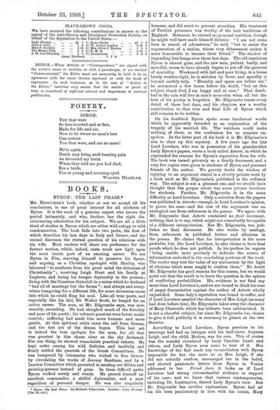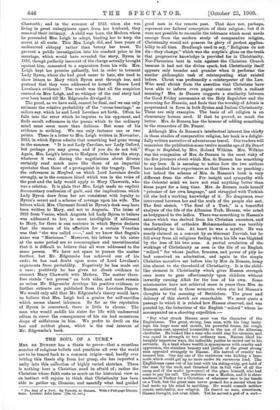BOOKS •
BYRON: THE LAST PHASE.*
Mn. EDGCUMBE'S book, whether or not we accept all his conclusions, is one of great interest for all students of Byron. It is the work of a genuine expert who knows the period intimately, and who, further, has the right dis- criminating admiration for his subject. We are all a little tired of studies in Byron which are either wild eulogy or wild condemnation. The book falls into two parts, the first of which describes his last days in Italy and Greece, and the second discusses the eternal question of his relations with his wife. Most readers will share our preference for the former section, which, indeed, casts much new light upon the most heroic part of an amazing career. We see Byron in Pisa, starving himself to preserve his figure, and arguing as a Christian apologist with Shelley, who laboured "to eradicate from his great mind the delusions of Christianity " ; receiving Leigh Hunt and his family at Leghorn, and losing his temper deplorably in the process ; living with the Countess Guiccioli in a union which he declared "bad all of marriage but the forms "; and always and every- where hungering for a different life, for some strenuous cause into which he could fling his soul. Like all true poets, and especially like his idol, Sir Walter Scott, he longed for an active career. The man, as Mr. Edgcumbe says, was now, morally, ascending. He had sloughed much of the frivolity and pose of his youth; his volcanic passions were better under 'control; suffering had made him more humane and more gentle. At this spiritual crisis came the call from Greece, and the last act of the drama began. This last act is indeed the true apologia for the man, for all that was greatest in him shone clear as the sky darkened. For one thing, he showed remarkable practical talents. He kept order among his wild Suliotes, and tactfully and firmly settled the quarrels of the Greek Committees. He was hampered by visionaries who wished to free Greece by circulating the works of Jeremy Bentham, and by a London Committee which persisted in sending out Bibles and printing-presses instead of grins. In these difficult paths Byron walked surely and wisely. He proved himself an excellent commander, a skilful diplomatist, and a man regardless of personal danger. He was also singularly • Byron : the Last Phase. By Richard Edycumbe, London John Murray. (10s. 6d. neta humane, and did much to prevent atrocities. His treatment of Turkish prisoners was worthy of the best traditions of England. Moreover, he showed no personal ambition, though he might well have made himself dictator. "I am not come here in search of adventures," he said, "but to assist the regeneration of a nation, whose very debasement makes it more honourable to become their friend." The shadow of impending fate bangs over these last days. The old capricious Byron is almost gone, and the new man, patient, hardy, and merciful, seems to have already begun to put off the garment of mortality. Weakened with toil and poor living, in a house barely weather-tight, he is stricken by fever, and speedily is
beyond earthly help. "Eternity and space are before me,"
he murmured a few hours before his death, "but on this
subject, thank God, I am happy and at ease." That death- bed in the rain will live in men's memories when all but the best of his poetry is forgotten. Mr. Edgcumbe traces every detail of these last days, and his chapters are a worthy contribution to that true and final Life of Byron which still remains to be written.
On his deathbed Byron spoke some incoherent words which he apparently intended as an explanation of the tragedy of his married life. The watchers could make nothing of them, so the confession for us remains un- spoken. In the latter part of his book it is Mr. Edgeumbe's aim to clear up this mystery. A few years ago the late Lord Lovelace, who was in possession of his grandmother Lady Byron's papers, wrote a book called Astarte, in which he expounded the reasons for Byron's separation from his wife. The book was issued privately as a family document, and a very few copies were given to students of Byron and personal friends of the author. We gravely doubt the wisdom of replying to an argument stated in a strictly private work by a book such as Mr. Edgcumbe's, published in the ordinary way. The subject is not a pleasant one, and we should have thought that the proper retort was some private brochure for students. Further, Mr. Edgcumbe is in the same difficulty as Lord Lovelace. Only a selection from the papers was published in Astarte—enough, in Lord Lovela.ce's opinion, to prove his case—and the rest of the argument was an analogical one from references in the poems. We agree with Mr. Edgcumbe that Astarte contained no final document, nothing, that is to say, which might not conceivably be capable of a different interpretation. But Mr. Edgcumbe, too, pub- lishes no final document. He also works by analogy, from references in published letters and allusions in the poems. He claims that his interpretation is the more probable, but, like Lord Lovelace, he also claims to have final proofs which be does not publish. In his preface he regrets " being unable more precisely to indicate the source of information embodied in the concluding portions of the work. The reader may test the value of my statements by the light of citations which seem amply to confirm them." No doubt Mr. Edgcumbe has good reasons for this course, but we would point out that the result is to leave the question in the sphere of conflicting probabilities. His evidence is not final any more than Lord Lovelace's, and we are bound to think his tone of angry denunciation against the author of Astarte wholly unjustified. Some lady's reputation was bound to suffer, and if Lord Lovelace assailed the character of Mrs. Leigh (as many had done before him), Mr. Edgcumbe takes away the character of Mary Chaworth, which has hitherto been unblemished. It is not a cheerful subject, but since Mr. Edgcumbe has chosen to give it full publicity it is necessary to glance at the two theories.
According to Lord Lovelace, Byron previous to his marriage had had an intrigue with his half-sister, Augusta Leigh, and the child, Medora, was his own. This of course was the scandal circulated by Lady Caroline Lamb and others, and Lady Byron soon came to hear of it. Her knowledge of the fact made any reconciliation with Byron impossible for her, the more so as Mrs. Leigh, if she did not actually confess, encouraged her in the belief, and showed passionate letters from Byron in Venice addressed to her. Prima fade it looks as if Lord Lovelace bad strong circumstantial evidence in support of his case ; and we know that various contemporaries, including Dr. Lushington, shared Lady Byron's view. But Mr. Edgcumbe has another explanation. Byron had all his life been passionately in love with his cousin, Mary Chaworth ; and in the summer of 1813, when she was living in great unhappiness apart from her husband, they renewed their intimacy. A child was born, the Medora whom. he persuaded Mrs. Leigh to adopt, binding her to keep the. secret at all oosts. This Mrs. Leigh did, and bore years of
undeserved obloquy rather than betray her trust. To prevent a public investigation into his conduct prior to his marriage, which would have revealed the story, Byron in 1816, though perfectly innocent of the charge actually brought against him, consented to a separation from his wife. Mrs.
Leigh kept her promise gallantly, but in order to torment Lady Byron, whom she had good cause to hate, she used to show letters to Mary which Byron sent through her, and pretend that they were addressed to herself. Hence Lord Lovelace's evidence ! The result was that all the suspicion centred on Mrs. Leigh, and no whisper of the real story had ever been heard till Mr. Edgcumbe divulged it.
The proof, as we have said, cannot be final, and we can only estimate the relative probability of the "cross-bearings," as sailors say, which he and Lord Lovelace set forth. Often he falls into the error which he imputes to his opponent, and finds occult references in the poems which to the ordinary mind must seem more than dubious. But some of his evidence is striking. We can only instance one or two points. There is a letter to Mrs. Leigh written in November, 1813, in which Byron admits that something had gone wrong in the summer. "It is not Lady Caroline, nor Lady Oxford, but perhaps you may guess, and if you do, do not tell."
Again, Mrs. Leigh's letters to Hodgson (who knew the story, whatever it was) during the negotiations about divorce certainly read much more like those of an impartial spectator than those of a protagonist in the tragedy. Then the references in Manfred, on which Lord Lovelace dwells strongly, as to the common blood which was in the veins of the poet and the lady would apply bo Mary Chaworth, who was a relation. It is plain that Mrs. Leigh made no explicit documentary confession of guilt, and the implications which
Lady Byron drew from her are consistent with loyalty to
Byron's secret and a scheme- of revenge upon his wife. The letters which Mrs. Clermont found in Byron's desk may have been written to Mary, and not to Augusta. The letter of 1819 from Venice, which Augusta led Lady Byron to believe was addressed to her, is more intelligible if addressed to Mary, for there is one, sentence in which Byron declares that the reason of his affection for a certain Venetian was that "she was called —," and we know that Segati's name was "Marianna." Moreover,, his letters to his sister at the same period are so commonplace and unsentimental that it is difficult to believe that all were addressed to the'
same person. We have not space to pursue the matter further, but Mr. Edgcumbe has achieved one of' his ends ; he has cast doubt upon some of Lord Lovelace's arguments from probability. Negatively he has made out a case; positively he has given no direct evidence to connect Mary Chaworth with Medora. The matter there- fore stands "not proven" on both sides, and MUM, remain so unless Mr. Edgcumbe develops his positive evidence, or further extracts are published from the Lovelace Papers. We would only add that Mr. Edgcumbe's theory would have us believe that Mrs. Leigh had a genius for self-sacrifice which seems almost inhuman. So far as the reputation of Byron is concerned, there is little to choose. The man who would saddle his sister for life with undeserved odium to cover the consequences of his sin had monstrous deeps of selfishness in him. We prefer to dwell on the last and noblest phase, which is the real interest of Mr. Edgcumbe's book.











































 Previous page
Previous page